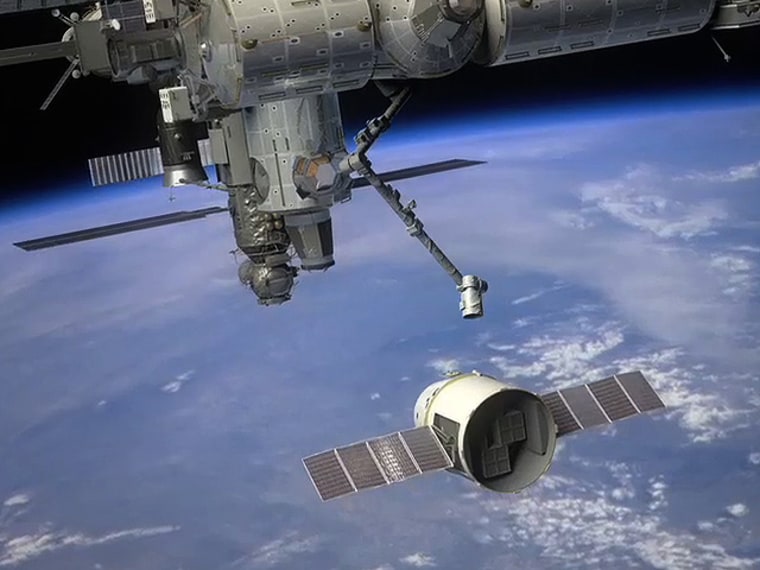The first commercial cargo run to the International Space Station is off until March.
SpaceX had planned to launch its unmanned supply ship from Cape Canaveral in Florida on Feb. 7. But the company said more testing was needed with the spacecraft, named Dragon. On Friday, officials confirmed that Dragon's launch on SpaceX's Falcon 9 rocket would not occur until late March.
SpaceX did not provide details on the further testing that would be required.
NASA closed out its 30-year shuttle program last July.
Space station commander Daniel Burbank said that he wanted to take part in the historic event, but that it was more important that SpaceX fly when it's ready. Burbank is due to return to Earth in mid-March.
"If that's not to be during our mission, then that's OK," Burbank said in an interview Friday with The Associated Press. "We've got plenty of other things to occupy us."
Just over a year ago, California-based SpaceX launched a test version of the Dragon capsule, becoming the first private business to send a spacecraft into orbit and return it safely in a Pacific Ocean splashdown. NASA is counting on companies like SpaceX to keep the station stocked, now that the shuttles are retired.
The plan for the demonstration cargo flight calls for the Dragon to approach the station, go through a series of communication tests, then get the go-ahead for a rendezvous. When the craft comes within a few yards (meters) of the docking port, the station's astronauts would grapple it with the station's robotic arm and bring it in for the hookup. Several hundred pounds of supplies would be brought aboard, and after about a week, the Dragon would undock and return to Earth.
If a glitch arises during the mission and the hookup is called off, another test flight would have to be scheduled. If the mission is judged totally successful, that would open the way for SpaceX to begin cargo flights in earnest under the terms of a $1.6 billion contract with NASA.
"This will be one step in the long road to human expansion off of the planet into low-Earth orbit and beyond," NASA astronaut Donald Pettit, one of Burbank's crewmates aboard the station, said Friday.
SpaceX spokeswoman Kirstin Brost Grantham pointed out that this is a developmental program for her company, and everyone wants it to be a complete success. "It may take a little more time, but when it happens, it's going to be amazing," she said.
SpaceX and another company, Virginia-based Orbital Sciences Corp., have received more than $600 million from NASA so far to support the development of commercial cargo spacecraft. Orbital is due to begin flight tests of its orbital cargo delivery system later this year.
In the meantime, NASA must depend on Russian Progress cargo craft as well as European and Japanese transports for space station resupply. The next Progress launch is scheduled for Jan. 26 from Russia's Baikonur Cosmodrome in Kazakhstan.
The beauty of the Dragon is that it will be able to return scientific samples to Earth, Burbank noted. None of the other countries' supply ships can do that; they burn up on re-entry.
Americans Burbank and Pettit, three Russians and a Dutchman make up the station's current six-man crew. "I think we're getting by OK," Burbank said, "but we need to have as much up-mass and down-mass capability as we can to support space station operations at the level we need it."
The hookups with U.S. commercial spacecraft would have to be cleared with the Russians and the other partners in the space station effort, and Russian officials have said they need solid safety assurances about the commercial operations before giving the go-ahead.
SpaceX is also one of the participants in a separate NASA program to develop commercial crew transports for use in the 2017 time frame.
More about commercial space efforts:
- The next steps in a new space race
- Space station crew eager for private craft's visit
- Private rocket launch to space station delayed
This report includes information from The Associated Press and msnbc.com.
